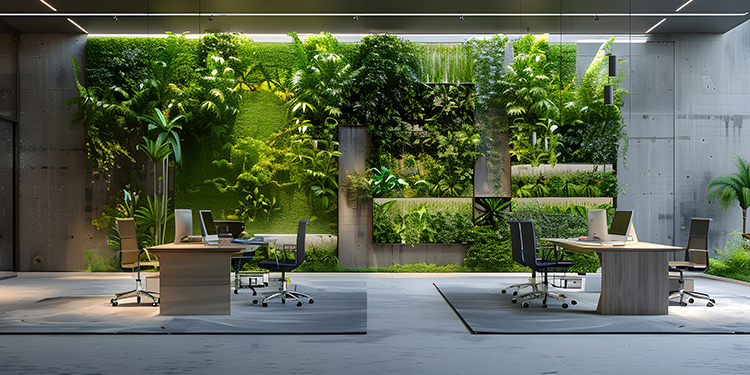Can workspaces play a role in the shift towards sustainability? The answer is a definite yes.
According to the World Green Building Council, buildings contribute to 39% of global carbon emissions. Out of this, 28% arises from just operational energy. From heating, cooling, and powering buildings. In this context, creating sustainable office spaces is an essential responsibility. Understanding the environmental weight of everyday choices is important, especially when the climate crisis is intensifying.
The way an office is designed and maintained also tells a story about the company’s culture, values, and commitment to the environment. Sustainable workspaces also influence the well-being of employees who spend much of their day within these environments. Rethinking sustainable design and practices is the need of the hour.
Understanding The Concept of Sustainable Office Spaces
A sustainable workspace or a green office is a setting where people coexist in a way that is mindful of the planet. Sustainability in this context is not just about reducing greenhouse emissions. It encompasses everything, from the choice of materials, technology, to how the space and resources are utilised. This is a long-term commitment. And one that requires strategies that benefit both the organisation as well as its people, without burdening future generations.
However, building truly sustainable workspaces is a challenge. Offices tend to be energy-intensive as their consumption of power for basic amenities is vast. Daily operations generate large volumes of waste such as paper, packaging and single-use plastics. Most traditional office setups lack greenery, which contributes to poor air quality and affects employee wellness. Addressing all these issues is important. This will lead to healthier, more environmentally responsible workplaces.
Ways to Create a Sustainable Workspace & Office Culture
Creating sustainable office spaces requires conscious decisions across design, operations, and daily practices. Below are some effective ways in which businesses can reduce their environmental footprint.
- Green Spaces and Elements
Incorporating greenery within the office space is a good place to begin. Place low-maintenance plants such as peace lilies, snake plants or pothos on desks and corners. Offices with balconies or open areas can add small gardens or install vertical green walls. These features add to the aesthetics and contribute to sustainability.
- Sustainable Furniture and Materials
Furniture and office interiors play a big role in sustainability. Choose items made from recycled or renewable materials. Modular furniture that can be rearranged or repurposed will reduce the need for frequent replacements. Balance renovation of existing furniture with mindful new purchases.
- Waste Reduction
Most modern offices generate a huge amount of daily waste. Going paperless, with digital tools as an alternative, is a great step towards sustainability. Setup recycling bins and composting stations. This will encourage responsible waste disposal. Switch to biodegradable office supplies and place eco-friendly toiletries. This way, companies can minimise unnecessary landfill contributions.
- Efficient Use of Office Space
Maximise existing office layouts. This will reduce the need to construct new buildings for workspace. Renovate unused areas or redesign layouts. A thoughtful approach to space management ensures resources are not wasted and are utilised to their full capacity.
- Energy Efficiency
Switching to energy-efficient systems will help lower your office’s carbon footprint. One simple way to do this is by replacing normal lights with LEDs and adding motion sensors in rooms. Smart HVAC systems also improve efficiency. Natural ventilation should be utilised wherever possible. Companies that are open to bigger investments should consider shifting to renewable energy sources such as solar power.
- Sustainable Office Practices
Use refillable water stations and reduce single-use plastics. Remember to switch off electronic devices when not in use. Try to take shared responsibility for maintaining greenery and carrying out sustainable practices consistently.
Why the Shift Towards Sustainability is Important
Sustainability in the workplace is becoming a necessity. Greener offices use less energy, produce less waste, and drive small changes that will collectively tackle climate change. For employees, the benefits are immediate: better air, more daylight, and spaces that support comfort. There is also a clear business case. Reduced energy bills and smarter resource use save money over time. Sustainable workspaces also signal responsibility and help organisations attract eco-conscious clients and talent.
Practising What We Preach at Garden Office Bermondsey
Garden Office Bermondsey places sustainability at the core of its workspace. These office spaces are housed in refurbished warehouse buildings of the former Sarsons Vinegar Brewery. Biophilic interiors at the Garden Office bring in natural light and greenery. To meet modern business needs, high-speed internet, adaptable meeting rooms, collaborative areas, and flexible lease options are available.
Explore Garden Office Bermondsey today and discover a workspace designed for businesses that value efficiency and sustainability.





